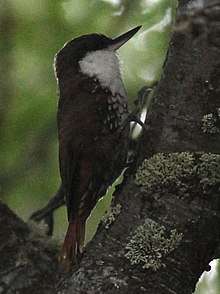White-throated treerunner
The white-throated treerunner (Pygarrhichas albogularis) is a species of bird in the family Furnariidae. It is monotypic within the genus Pygarrhichas.[2] It is found in South America, in Patagonia and southern regions of Tierra del Fuego. Its natural habitat is temperate forests.[1]
| White-throated treerunner | |
|---|---|
 | |
| Scientific classification | |
| Kingdom: | Animalia |
| Phylum: | Chordata |
| Class: | Aves |
| Order: | Passeriformes |
| Family: | Furnariidae |
| Genus: | Pygarrhichas Burmeister, 1837 |
| Species: | P. albogularis |
| Binomial name | |
| Pygarrhichas albogularis (King, 1831) | |
Description
The white-throated treerunner is 15 to 16 cm long on average, with a weight between 20 and 27 grams.[3][4] It has an appearance reminiscent of the nuthatch, with its overall look and plumage, unlike other species in the Furnariidae.[3] Wing chord is from 76 to 86 mm, tail is 52 to 65 mm, and torso from 20 to 23.7 mm.[5] The iris is dark brown.[3] It has a long beak, at around 16 to 23.8 mm with a slight upward curve.[4][5] Its upper mandible is dark gray and lower mandible a whitish-pale gray.[3] The feet are dark gray, blackish or brown.[3]
The species is easily recognized by its white throat, contrasting with its upper parts.[5] Its face is blackish-brown and slightly darker than its head crown, which is a dull brown.[3] The back is a paler chestnut-brown,[3]pulling against the red rump and tail.[5][6] The wing coverts are dark brown, with red or chestnut brown on the feather edges and tail end. The primaries are darker, the remiges black-brown with light edges and inner primaries marked with a short, light red wing bar. The tail is rounded, with rigid rectrices with shortened barbs ending in small spines up to 9 mm long.[3]
A large white zone covers the treerunner's cheek and throat, descending to the middle of the chest. The rest of the lower parts, to the undertail coverts, are made up of white feathers largely bordered with dark brown, giving an irregularly spotted appearance. Both sexes of adults look similar. The chick is distinguished by an ochre-striped crown and back, and often with blackish borders on the throat feathers.[3]
Vocals
The white-throated treerunner gives off a short and piercing cry, evoking a rapid succession of water droplets.[5] Its contact call is described as a loud, fast, metallic “kik-ik”, “tsi-ik” or “tsik”, which is repeated rapidly. The treerunner can also emit a sonorous “peet peet”, and during flight, a dry “tic”.[3]
References
- BirdLife International (2012). "Pygarrhichas albogularis". IUCN Red List of Threatened Species. 2012. Retrieved 26 November 2013.CS1 maint: ref=harv (link)
- "ITIS Report Pygarrhichas". Integrated Taxonomic Information System. Retrieved 29 July 2014.
- "White-throated Treerunner (Pygarrhichas albogularis)". HBW Alive. Retrieved 2019-09-03.
- Rozzi, R.; Jimenez, J.E. (2014). Magellanic Sub-Antarctic Ornithology: First Decade of Long-Term Bird Studies at the Omora Ethnobotanical Park, Cape Horn Biosphere Reserve, Chile. University of North Texas Press & Ediciones Universidad de Magallanes. p. 62. ISBN 978-1-57441-531-5. Retrieved 2019-09-03.
- Rozzi, R.; Massardo, F.; Program, S.A.B.C. (2010). Multi-ethnic Bird Guide of the Sub-Antarctic Forests of South America. Multi-ethnic Bird Guide of the Sub-Antarctic Forests of South America. Sub-Antarctic Biocultural Conservation Program, University of North Texas - Universidad de Magallanes. p. 63. ISBN 978-1-57441-282-6. Retrieved 2019-09-03.
- Chester, S. (2010). A Wildlife Guide to Chile: Continental Chile, Chilean Antarctica, Easter Island, Juan Fernández Archipelago. Princeton University Press. p. 250. ISBN 978-1-4008-3150-0. Retrieved 2019-09-03.
